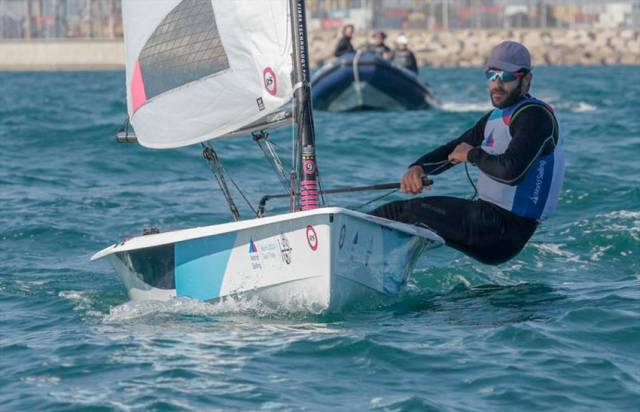RS Sailing has issued an open letter to World Sailing in its bid for the men’s and women’s Olympic single-handed dinghy classes currently appointed to the Laser and Laser Radial.
Late last year the RS Aero was selected along with the incumbent Lasers, the Melges 14 and D-Zero from a total of eight bidders for equipment trials for the 2024 Olympic Games in Paris.
More recently, each of these boats (the incumbents excluded) were evaluated in sea trials for men and women in Valencia, Spain in March of this year.
Further trials will be conducted before a final decision is made by December 2020.
But the directors of UK-based RS Sailing — design and tech chief Alex Southon, commercial chief Jon Partridge, sales director Riki Hooker and c-founded Martin Wadhams — are already making their appeal to World Sailing and its member national associations to see the RS Aero as the future of single-handed dinghy sailing at the Olympics.
The full letter is included below:
Dear Mr President and all,
In the coming days World Sailing will make decisions that are likely to affect our sport for the next couple of decades and we feel it appropriate to share our views.
Over the last twenty‐five years we have created RS Sailing and built it into the world’s leading small sailboat brand. We have changed the face of small boat sailing in many parts of the globe, we have made friends on every continent and shared beers in many sailing clubs. We are proud of RS Sailing’s achievements, made not by a few people but by many sailors who believe our sport can be better.
We have not got everything right, but we have listened to the sailors and done our best to create boats and events that are right for the future of our sport. That is why we’re now the brand leader.
We always knew the decision regarding the Olympic single‐hander would be highly charged and the odds are stacked in favour of the incumbent. But the coming decisions are not just about the Olympians; this universal sector drives the youth pathways and the opportunity to build women’s participation as well. The sport is currently in decline in many regions and we all share the primary responsibility to reverse that trend.
The Evaluation was clear. Detractors will always find details to argue but the fact remains the people involved were unanimous in their view that the RS Aero offers clearly the best opportunity – for the youths, women and Olympians.
The boat is ultra‐light, dynamic and better suited to working with a range of rig sizes for light to heavy sailors. It uses high tech construction for competitive longevity. It is backed by the RS organisation, seen as the most capable of delivering consistent high quality to the world through our existing infrastructure and an international FRAND production network on every continent.
Look what happened to cycling when the equipment became light and sexy – the sport exploded.
Conversely, the current Equipment design is fifty years old and heavy. Whatever the rigs, the hull is heavier than many of the sailors it seeks to serve… Lift your bike, ride your bike and think about it...
The issues between the various organisations that build and manage the current Equipment are well documented and long running. They make life harder for many sailors and organisers. Recent communications make it clear that solutions have not been agreed. The issues and potential for litigation against all parties involved distract from growing our sport and threaten World Sailing’s reputation – indeed sailing’s reputation within the Olympic movement.
So, over to you World Sailing. The experts you selected have told you that the RS Aero is the best Equipment for the future of sailing and we have proved ourselves credible partners. The current Equipment was second ranked, even without factoring in ongoing commercial issues.
You can select new Equipment; you can simply ignore the information laid out by the experts and make no change; or you can take some time to consider what is best for the direction of our sport. A smooth transition is possible – perhaps starting with the women’s fleet or the youth pathway.
We offer you a chance to inspire the next generation.
We offer the RS Aero.
Yours,
Alex, Jon, Riki and Martin






























































